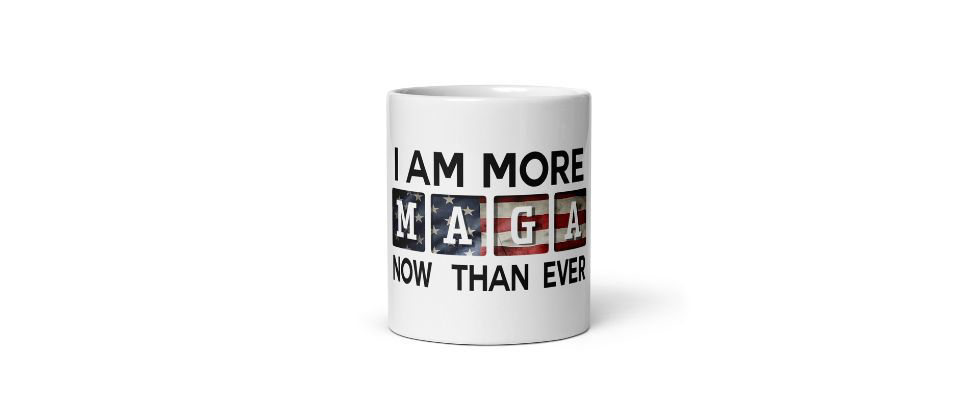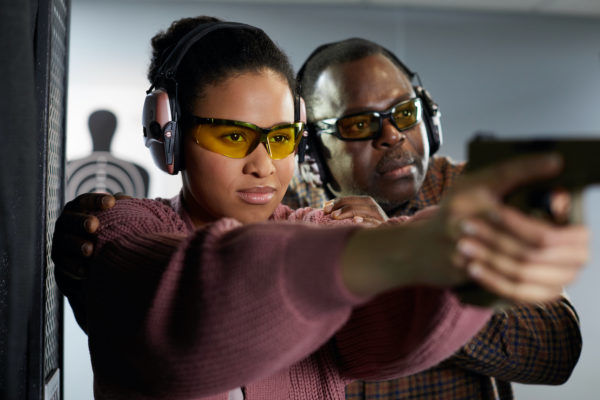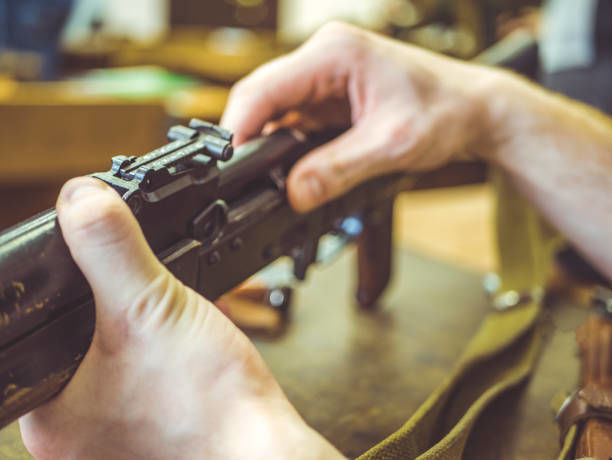1. Always point the gun in a safe direction.
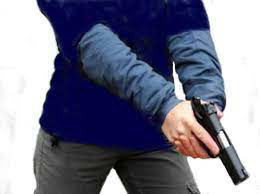
This is the most important safety rule. If everyone was careful and never pointed a gun at anything they didn't want to shoot, there would be almost no gun accidents. It’s that simple, and it’s up to you.
Never point your gun at anything you don’t want to shoot. This is very important when loading or unloading a gun. If the gun goes off by accident, no one will get hurt if it points in a safe direction.
A safe direction means a direction where a bullet can't hit anyone. Bullets can bounce off things and go through walls and ceilings. Sometimes a safe direction is up, and sometimes it's down, but never at anyone or anything you don’t want to shoot. Even when practicing with an unloaded gun, never point it at an unsafe target.
Always know where your gun is pointing and be in control of it, even if you trip or fall. This is your responsibility, and only you can make sure of it.
2. Firearms should be unloaded when not in use.

Load your gun only when you are in the field, on the target range, or ready to shoot. When not in use, keep guns and bullets in a safe place, away from each other. It's your job to make sure children and others can’t get to them.
Unload your gun as soon as you’re done shooting. A loaded gun should not be in or near a car, truck, or building. Always unload your gun before bringing it into a car, camp, or home.
When you handle a gun or give it to someone, open it right away and check to make sure there are no bullets inside. Keep the gun open when not in use. Never assume a gun is unloaded—always check yourself! This shows you know how to handle guns safely.
Never climb a fence, tree, or do anything tricky with a loaded gun. In the field, use common sense and follow safety rules by unloading your gun for maximum safety. Never pull or push a loaded gun towards yourself or someone else. Never carry a loaded gun in a scabbard, a holster not being worn, or a gun case. When unsure, unload your gun!
3. Don't rely on your gun's "safety."
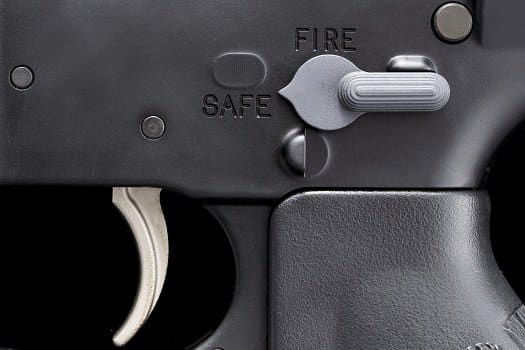
Always treat every gun as if it can shoot at any time.
The "safety" on a gun can fail or be accidentally turned off. Safety helps, but it can’t replace being careful. Never handle a gun carelessly and assume it won’t fire because safety is on.
Don’t touch the trigger until you are ready to shoot. Keep your fingers away from the trigger while loading or unloading. Never pull the trigger when the safety is on or in between "safe" and "fire." The gun could still fire at any time.
Always keep the safety fully on until you are ready to shoot. A strong bump or drop can make the gun fire even if you don’t touch the trigger. Never rest a loaded gun against anything, as it could fall and fire. The only time you can be sure a gun won’t fire is when it is open and empty. Remember, being careful is the best safety measure.
4. Be sure of your target and what’s beyond it.
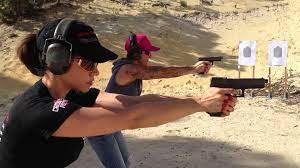
Once you shoot a gun, you can't take the bullet back. You lose control over where it goes. Only shoot if you know exactly what your bullet will hit. Make sure your bullet won’t hurt anyone or anything beyond your target. Don't shoot at a movement or noise without knowing what it is. Always check your target and what’s behind it before you pull the trigger.
Remember, bullets can travel very far. A .22 bullet can go over 1 mile, and a high-speed bullet like a .30-06 can go over 3 miles. Shotgun pellets can travel 500 yards, and shotgun slugs can go over half a mile. Think about how far a bullet can go if it misses or bounces off something.
5. USE CORRECT AMMUNITION

You must use the right ammunition for your gun.
Always read and follow the warnings in the gun’s manual and on the ammunition boxes. Using the wrong ammunition can break your gun and hurt you. It only takes a second to check each cartridge before loading it to make sure it matches your gun’s instructions and markings.
Guns are made to work with specific, factory-made ammunition. Handloaded or reloaded ammunition that doesn’t follow the right standards can be dangerous. Never use unknown or improper reloads.
If ammunition gets very wet or soaked, throw it away safely. Don’t spray oil or solvents on ammunition or put it in guns with too much oil. This can cause poor performance or damage to your gun and could hurt you or others.
Make it a habit to check every cartridge you load. Never use damaged or bad ammunition—the money you save isn't worth the risk of getting hurt or ruining your gun.
6. If your firearm doesn’t fire when you pull the trigger, be careful!
Sometimes, a bullet won’t fire when you pull the trigger. If this happens, keep the gun pointed in a safe direction and keep your face away from the back of the gun. Carefully open the gun, unload it, and safely get rid of the bullet.
Remember, if there’s a bullet in the chamber, the gun is loaded and can fire at any time, even if it didn’t go off before. Always follow the first rule and keep the muzzle pointed in a safe direction!
Shooting in places with poor ventilation, cleaning guns, or handling bullets can expose you to lead and other harmful substances. Always have good ventilation, and wash your hands thoroughly after handling guns or ammunition.
7. Always wear eye and ear protection when shooting.
All shooters should wear protective glasses and hearing protectors. Shooting noise can damage your hearing, and you need to protect your eyes. Shooting glasses protect against things like twigs, flying debris, and gun malfunctions. Wear eye protection when taking apart and cleaning guns to protect against springs, parts, and chemicals.
There are many types of eye and ear protectors available. Every shooter should use them, whether target shooting, plinking, or hunting. Most safety rules protect everyone, but this one is for your own safety. Protecting your hearing and eyes also makes shooting easier and more enjoyable.
8. Make sure the barrel is clear before shooting.
Before you put bullets in your gun, open it up and check that there's no ammo in the chamber or magazine. Also, make sure there's nothing blocking the barrel. Even a tiny bit of mud, snow, or too much oil or grease inside can make the gun explode when you shoot it. This could hurt you or people nearby. Always clean the barrel and check for blockages with a rod right before you use it.
If the gun sounds weak or doesn’t feel right when you shoot it, stop shooting right away. Check to see if anything is stuck in the barrel that shouldn’t be there.
Putting a smaller bullet into a bigger gun, like a 20-gauge bullet in a 12-gauge shotgun, can make the smaller bullet get stuck in the barrel. This can make the barrel explode or worse. Take your time and be careful with each bullet you put in your gun to avoid accidents like this.
9. Don’t change your firearm or try to fix it yourself.
Guns are made by experts to work a certain way. Changing or fixing a gun after it’s made can make it dangerous. It can also cancel any warranties it comes with. Don’t risk your safety or others’ safety by changing things like the trigger or safety yourself, or by letting someone who isn’t qualified do it. You might end up ruining an expensive gun. Just don’t do it!
Firearms are machines that wear out over time and need to be checked and serviced regularly. Ask the company that made your gun how often it should be serviced and take it to a gunsmith when it is time.
10 Learn about the firearm you’re using.
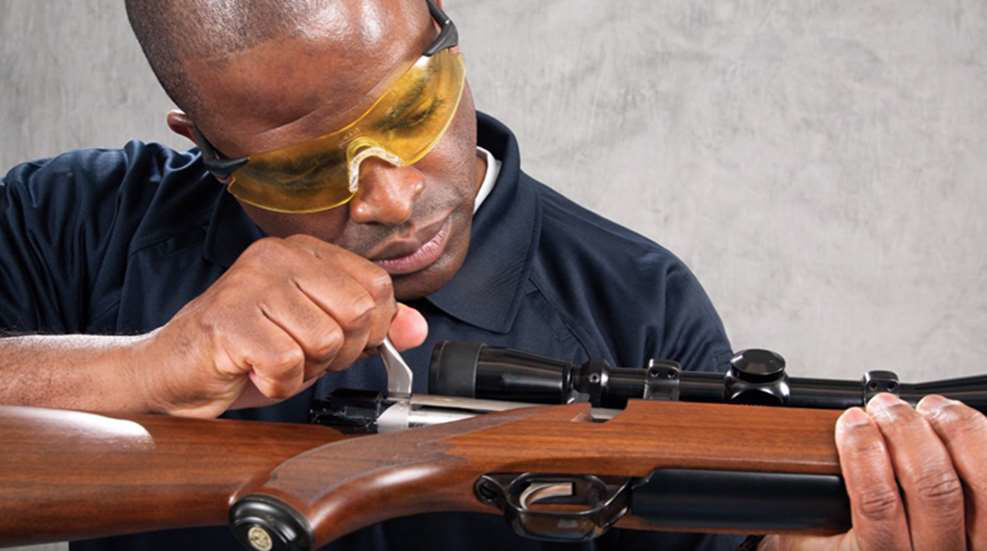
Not all firearms are alike. Each gun works differently, so it’s important to know how yours works before you use it. Learn the rules for safely loading, unloading, carrying, and handling your specific gun, and general gun safety rules.
For example, some handgun makers say their guns should always be carried with the hammer down on an empty chamber. This is especially true for older single-action revolvers and some double-action revolvers or semiautomatic pistols. Read the manual that came with your gun. If you lose it, ask the company for a new one.
Owning a gun means you must pay attention all the time. You can’t guess or forget how to use, handle, and store your gun safely. Never use a gun unless you fully understand how it works and how to use it safely. No gun is totally foolproof.
Hunting and target shooting are very safe sports. This list will help make them even safer by focusing on the basics of handling and storing guns safely. Remember, you are the most important factor in keeping firearms safe.
To do your part, take classes on hunting safety or shooting safety. Always emphasize safety when you handle guns, especially around kids and people who don’t shoot often. Beginners should always have someone watching them closely when they use a gun they’re not used to.
Don’t be afraid to speak up about gun safety. If you see anyone not following safety rules, it’s important to insist they do things safely, like the ones on this list.
Follow these safety steps, build good habits, and remember that keeping guns safe is your responsibility.




